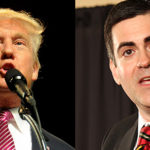WACO—Evangelicals engage American culture most effectively not by mimicking it but by offering an alternative centered on the cross of Christ, ethicist Russell Moore told a Baylor University crowd.
Moore, president of the Southern Baptist convention’s Ethics & Religious Liberty Commission, delivered a lecture sponsored by Baylor’s Institute for Studies of Religion, focusing on the question, “Is there a future for evangelical cultural engagement?”
Willie and Waylon and the boys
The “outlaw country” movement spearheaded by Willie Nelson and Waylon Jennings offers a parable for evangelical Christians, Moore asserted.
When the Nashville recording industry embraced a polished approach almost indistinguishable from pop music, “Willie and Waylon and the boys” stuck to a gritty and authentic “back-to-the-basics” sound, he noted.
“The outlaws were not outlaws because they rejected the country music tradition but because they loved it,” he said.
Likewise, evangelical Christians can speak a relevant word to society not by mirroring the dominant culture but by preaching a counter-cultural message grounded in orthodox Christianity and centered on the cross of Christ, Moore insisted.
‘Cross-shaped’ faith
“An evangelicalism able to face the future must be cross-shaped,” Moore said.
The cross of Christ transformed the attitude of the early church toward power and weakness, success and failure, and life and death, he said.
Evangelical churches must resist the temptation to measure their success in society’s terms, he insisted.
Sign up for our weekly edition and get all our headlines in your inbox on Thursdays
“The entrepreneurial nature of American evangelicalism is both a help and a burden,” he said.
On the one hand, a religion centered on personal conversion and suspicious of institutions offers freedom to evangelize and engage in missionary outreach in innovative ways.
“On the other hand, this free-market ecclesiology of evangelicalism can easily become market-driven to the point of eclipsing the distinctiveness it offers the world in the first place,” he said.
Counter-cultural—sometimes
Too often, society at large views evangelical Christians as “censorious scolds” who want to impose their moral standards on nonbelievers while overlooking shortcomings in their own ranks, Moore said.
In fact, evangelical Christians genuinely are counter-cultural in terms of their charitable giving and their professed beliefs about sexual morality, he noted. But they frequently fall short in areas such as the practice of sexual integrity, as seen in the prevalence of divorce and pornography use among evangelicals, he asserted.
“We are often only as counter-cultural as we want to be,” he said.
Radical discipleship
Some young evangelicals are drawn to a call to radical discipleship, Moore noted.
“These calls for a more radical Christianity are not so much about youthful zeal or the quest for the extraordinary as they are a call to combat the skepticism and cynicism that would see Christianity merely as a prop for white, middle-class, suburban American culture,” he said.
These “restless, gospel-centered Christians” reject the market-driven message preached in some pulpits that offers “a kind of cross-less moralism that can tell people how to live their best lives but cannot tell them how to lose their lives,” Moore said.
Society offers plenty of secular self-help gurus and life coaches, and non-Christians will not seek solutions from churches that offer nothing distinctive from the prevalent culture, he noted.
“A pragmatic, moralistic or therapeutic Christianity can only ensure the growth of churches when a culture believes that the church supplies something that’s missing,” he said.
Different perspective
Evangelicals need to embrace the cross and be shaped by it, Moore insisted. At the cross, Christians find evidence both of God’s righteousness and his judgment of sin, as well as God’s gracious mercy and love toward sinners, he noted.
“Evangelical Christianity should have a different perspective” than the culture in general, Moore asserted.
“Our theology should drive us to see people on the outside not as with us or against us, not as winners or losers, my tribe vs. your tribe, my ethnicity vs. your ethnicity, my vision vs. your vision, or even as moral or immoral,” he said.
Instead, evangelicals should recognize the sinful state of all humanity and see non-Christians as having the potential to be redeemed by God’s grace, he said.
“The next Billy Graham might be passed out drunk or in a crack house right now,” he said.
High standards, gentleness
Churches need to maintain discipline within their own membership but show patient mercy to people who have not been transformed by God’s saving power, he insisted.
A church that is confronted with the cross will “deal gently with those who are on the outside, while holding high standards of accountability for the doctrinal, personal and ethnicity integrity of those who are on the inside,” Moore said.
Too often, the church mutes its criticism of behavior within its ranks while condemning the world outside, he noted.
An honest look at the cross will make it clear individual personal regeneration will not immediately solve every societal problem, he added. Christianity involves bearing each other’s burdens, he insisted.
“Jesus did not die for a collection of individual action figures, each sold separately,” Moore said.
Identify with the vulnerable
Furthermore, the centrality of the cross should cause evangelicals to reject worldly values of power and prestige in favor of standing with the vulnerable and weak, he said. By submitting to death on the cross, Jesus willingly identified with the forgotten and forsaken, he added.
The cross gives evangelical Christians a different view of history and a distinctive way of viewing society, he said.
“In this very polarized cultural moment, almost every tribe in American life tends to be carried along either by a sense of cultural triumphalism or a sense of cultural decline,” he said.
A cross-focused identity offers another way for evangelicals, he asserted. By recognizing themselves as exiles in a foreign land, followers of Christ can avoid both naïve accommodation to culture and “frantic, perpetual outrage” about society, he said.
Gospel ‘thrives on the margins’
The gospel “thrives on the margins” of society, Moore said.
When Christians sought to bring about change by exercising power from a position of strength—such as in the Prohibition movement—their efforts failed, he noted.
But when Baptists on the margin of society argued for religious liberty and African-American churches who lacked power sought to advance civil rights, they prevailed, he added.
“Lack of cultural power helped their message be heard,” he said.














We seek to connect God’s story and God’s people around the world. To learn more about God’s story, click here.
Send comments and feedback to Eric Black, our editor. For comments to be published, please specify “letter to the editor.” Maximum length for publication is 300 words.